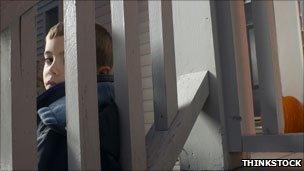Parents warned over plans to cut criminal record (CRB) checks
- Published
- comments

The government says the system of checks on child workers has become too bureaucratic
Parents should teach their children about the risk of paedophiles, a minister has said as he defended plans to ease Criminal Records Bureau checks.
Lord Henley said the current system was "disproportionate" with "unnecessary red tape and discourages volunteering".
Ministers plan to drop the checks for adults if someone who has been cleared, such as a teacher, is supervising.
But Lord Bichard warned "dangerous adults" would "take advantage" of the proposed changes.
Lord Bichard, whose report after the murder of Soham schoolgirls Holly Wells and Jessica Chapman by a school caretaker led to the present system being set up, warned the safety of children "must come before our desire to minimise regulation and bureaucracy".
He said that "children assume that adults who are trusted to offer guidance or instruction can be trusted - not just in those limited circumstances such as the youth centre or playing field but wherever they are encountered".
"I fear that we will very quickly find that dangerous adults will realise that there are some settings and some ways in which it will be easier in future for them to gain access to vulnerable children," he told peers.
"The people we are talking about are manipulative and clever. They will take advantage of those opportunities."
The proposal to cut the need for Criminal Records Bureau checks for adults working under supervision with children is part of the red tape-cutting Protection of Freedoms Bill currently being pored over in the Lords.
Deputy Prime Minister Nick Clegg announced the proposed change a year ago, saying he wanted to get the checks "into proportion" and end the "atmosphere of distrust over adults who are simply trying to do their best by their own children".
Defending the proposed changes, Home Office minister Lord Henley said that "whatever the setting, we believe that parents have the primary responsibility for educating their child in how to react to an approach from an adult if it goes beyond that adult's normal role".
Lord Henley said "what we are trying to do is create a system that will provide the necessary safeguards but does not make parents feel that their children are automatically safe - parents must still have the duty of looking after their children by warning them of potential dangers".
'Not fair to parents'
He also conceded that schools and other organisations would be allowed to insist on CRB checks: "We want to emphasise the importance of good sense and judgement by the managers on the ground when they look at the issue."
A number of peers joined Lord Bichard in raising concerns - including the Archbishop of York - that dangerous adults who gain children's trust in the supervised setting might be able to take advantage of that trust when not supervised later.
One of those unhappy with the plans, Labour peer Lord Harris of Haringey, said he agreed a balance had to be struck and "no system will necessarily protect all children against abuse and against predators".
But, he said, "the difficulty is that the normal assumption of parents will be that every person whom their child comes into contact with in a club or other activity is safe".
Lord Bichard, who withdrew his amendment to the government's plans after assurances there would be further discussions about the issue, said all sides agreed on the need for less bureaucracy.
The issue was the need to avoid people who were a risk having "privileged access to our children".
"Parents expect schools, clubs and centres to be places where they can leave their children with some confidence... I do not think it is fair to expect parents to be able to monitor those kinds of situations."
- Published11 February 2011
- Published1 February 2011